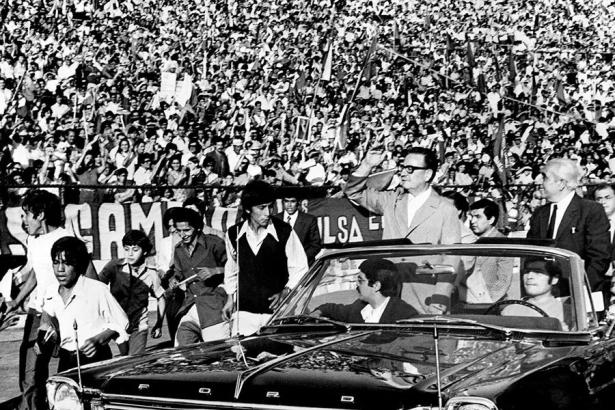 Salvador Allende campaigning before Chile’s parliamentary elections, Santiago, February 1973,STF/AFP/Getty Images Salvador Allende campaigning before Chile’s parliamentary elections, Santiago, February 1973,STF/AFP/Getty Images September 3, 2023 Ariel Dorfman THE NEW YORK REVIEW On September 4, 1973, an enormous multitude of Chileans—I was one of them—poured into the streets of Santiago to back the besieged government of Salvador Allende. Ever since he had won the presidency three years earlier with 36.6 percent of the vote in a three-way race, forces from inside and outside the country had been conspiring to destroy his attempt—the first in world history—to build a socialist state through nonviolent, democratic means. One shout from a chorus of voices echoed through the air: “Allende, Allende, el pueblo te defiende,” emphasizing the need to defend the president. After one thousand days of unrelenting opposition, his enemies seemed close to orchestrating a coup d’état that would wipe “the Marxist cancer” from Chilean society forever. Allende felt cornered. I knew this because, though only thirty-one at the time, I had been working for the previous two months at the presidential palace of La Moneda as a cultural and press adviser to Fernando Flores, Allende’s chief of staff, and our reports indicated that many admirals and generals were openly plotting against him. Allende nevertheless remained hopeful. Unlike that of so many Latin American nations, Chile’s military had a lengthy tradition of respect for constitutional rule, with smooth transitions between presidencies guaranteed by its strict nonintervention in political affairs. Thus far the army, at least, had continued to profess loyalty to the government. I remember Flores telling me with glee that General Augusto Pinochet, the head of the army, was in his pocket, nicely tied up: “Este Pinoccho! Lo tengo en este bolsillo, bien amarrado.” Allende also believed this was the case, but he placed his real faith in the mobilization of el pueblo (a term that encompasses several meanings in Spanish: the people, the masses, the poor, the great unwashed). And the Chilean pueblo had many reasons to support the Allende experiment. His cabinet—the first to include a peasant and an industrial worker as ministers—had undertaken a series of reforms, the most impressive of which was the nationalization of the enormous copper mines, until then owned by predatory US corporations. It had also nationalized the mining of minerals like nitrate and iron, as well as many banks and large factories, a number of which were being administered by those who worked in them.1 An ambitious agrarian reform had been handing over latifundios—large rural estates—to the peasants who had toiled on them from time immemorial; by 1973 almost 60 percent of Chile’s arable land had been expropriated. https://portside.org/2023-09-03/defending-allende Salvador Allende campaigning before Chile’s parliamentary elections, Santiago, February 1973,STF/AFP/Getty Images
0 Comments
Your comment will be posted after it is approved.
Leave a Reply. |
Principles North Star caucus members
antiracismdsa (blog of Duane Campbell) Hatuey's Ashes (blog of José G. Pérez) Authory and Substack of Max Sawicky Left Periodicals Democratic Left Socialist Forum Washington Socialist Jacobin In These Times Dissent Current Affairs Portside Convergence The Nation The American Prospect Jewish Currents Mother Jones The Intercept New Politics Monthly Review n+1 +972 The Baffler Counterpunch Black Agenda Report Dollars and Sense Comrades Organizing Upgrade Justice Democrats Working Families Party Poor People's Campaign Committees of Correspondence for Democracy and Socialism Progressive Democrats of America Our Revolution Democracy for America MoveOn Black Lives Matter Movement for Black Lives The Women's March Jewish Voice for Peace J Street National Abortion Rights Action League ACT UP National Organization for Women Sunrise People's Action National Network for Immigrant and Refugee Rights Dream Defenders |
 RSS Feed
RSS Feed